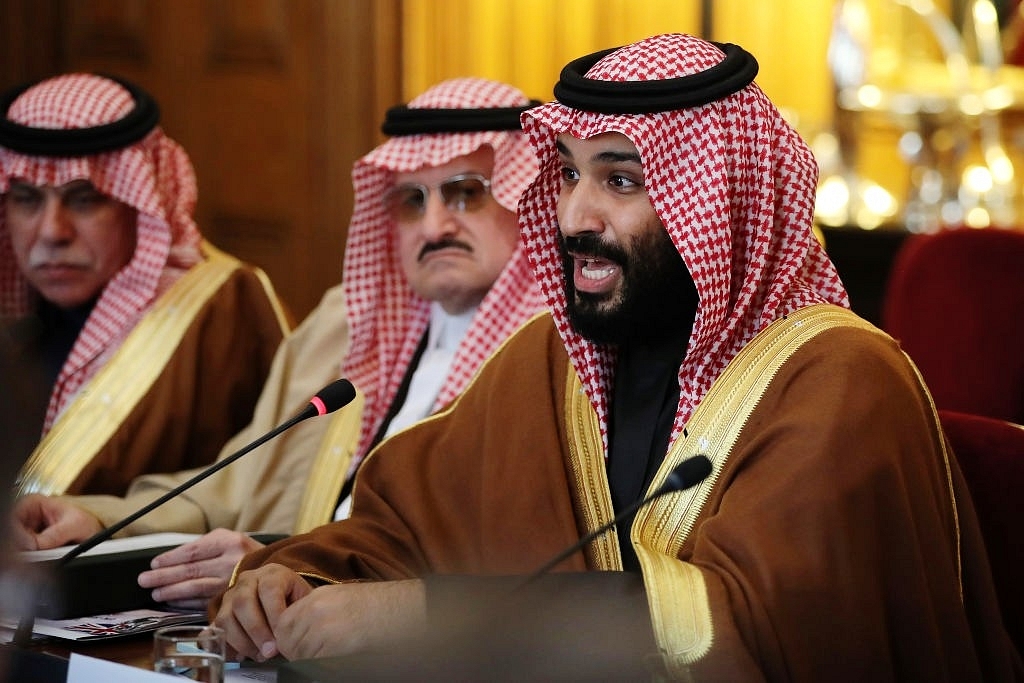Insta
Saudi Arabia’s Shia Persecution: Sunni Monarchy To Execute Human Rights Activist Arrested At Age 13

Saudi Crown Prince Mohammed bin Salman. (Dan Kitwood - WPA Pool/Getty Images)
During 2011 Arab Spring, in Saudi Arabia’s Eastern Province, 10-year-old Murtaja Qureiris led a group of around 30 children on bicycles demanding human rights for the people in the Islamic monarchy.
“The people demand human rights!” he shouted from his microphone. Three years later, at the age of thirteen, he was arrested under the charges of sedition. He was charged with accompanying his activist brother, Ali Qureris, on a motorcycle ride to a police station in the eastern Saudi city of Awamiya, where Ali allegedly threw Molotov cocktails at the facility. Qureiris has denied the charges and said that the confessions, which the prosecution has largely relied on, were obtained under duress
According to the rights group Reprieve, majority of the 37 people executed by the kingdom in the month of April belong to the minority Shia community.
Murtaja was 11 when his brother died in protests described as violent by the kingdom. Videos of his funeral obtained by CNN showed mourners chanting anti-government slogans. According to activists, another brother of Murtaja is jailed while his father was detained last year.
Under the Sharia law prevalent in the kingdom, “sowing of sedition” warrants the worst possible punishment, and Murtaja was awarded death penalty for the alleged crime. He was handed over the death sentence when he was few months short of turning 18. In 2006, Saudi Arabia told the Committee on the Rights of the Child that it had raised age of criminal responsibility to 12, according to Human Rights Watch.
Scholars estimate that there are 15 to 20 per cent Shias in the Kingdom ruled by House of Saud, followers of Wahhabi movement within Sunni Islam. The government actively suppresses the Shiite minority under influence of Wahhabi ideology. In 1988, country’s leading cleric denounced Shias as apostates, and in 1994, a member of the Higher Council of Ulama sanctioned the killing of Shiites.
Shias are systematically kept out of the public jobs. Unlike other countries with sizeable Shia population, Saudi Arabia has no Shiite cabinet ministers, mayors or police chiefs.
Saudi Arabia is often cited as a glaring example of religious apartheid. Pakistani columnist Mohammad Taqi says that in Saudi Arabia, Shiite grievances are “a result of religious repression and political marginalisation bordering on apartheid." Human Rights Watch’s 2009 report said that Shiite citizens in Saudi Arabia "face systematic discrimination in religion, education, justice, and employment".
Ali al-Ahmed, Director of the Institute for Gulf Affairs, called Saudi Arabia "a glaring example of religious apartheid”. He said, “Wahhabi Islam is imposed and enforced on all Saudis regardless of their religious orientations. The Wahhabi sect does not tolerate other religious or ideological beliefs, Muslim or not. Religious symbols by Muslims, Christians, Jewish and other believers are all banned”.
In January 2016, Saudi Arabia executed the prominent Shiite cleric Sheikh Nimr, who had called for pro-democracy demonstrations, along with forty seven others. Since May 2017, in response to anti-government protests, the kingdom is using full force, especially in predominantly Shia town of Al-Awamiyah.
In South Asia, Shia minority in Pakistan also alleges discrimination at hands of the government. Despite the founder of the Islamic republic, Jinnah, being an Ismaili Shia, Shia civilians in the country are massacred, raped, brutalised, and regularly killed in attacks by the radical, extremist Sunni organisations, while the government maintains silence.
Support Swarajya's 50 Ground Reports Project & Sponsor A Story
Every general election Swarajya does a 50 ground reports project.
Aimed only at serious readers and those who appreciate the nuances of political undercurrents, the project provides a sense of India's electoral landscape. As you know, these reports are produced after considerable investment of travel, time and effort on the ground.
This time too we've kicked off the project in style and have covered over 30 constituencies already. If you're someone who appreciates such work and have enjoyed our coverage please consider sponsoring a ground report for just Rs 2999 to Rs 19,999 - it goes a long way in helping us produce more quality reportage.
You can also back this project by becoming a subscriber for as little as Rs 999 - so do click on this links and choose a plan that suits you and back us.
Click below to contribute.
Latest